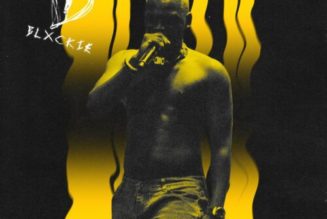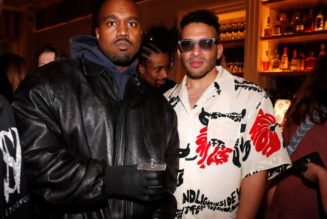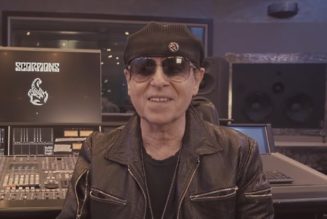The line stretched around the block, to Houston Street on Manhattan’s West Side, south down Wooster, wrapping around Prince and then back up Greene Street, the tail end bumping up against the entrance. The kids all looked the part: KENZO, BAPE, Human Made and Supreme, logos as prominent and fresh as their Air Force 1s, dutifully waiting for the chance to pick from a selection of exclusive $130 T-shirts, $450 sweatshirts and $2,000 varsity jackets inside.
For a streetwear fan on a Saturday in New York, there was no better place to be than here, outside a SoHo pop-up shop celebrating the latest collaboration from Nigo. The Japanese cultural legend — who founded BAPE in 1993 and ushered in an aesthetic that made him one of his generation’s most iconic fashion designers and tastemakers — was putting out his first album in 17 years, I Know Nigo!, and, as with many of his projects, this one was multifaceted, with its own limited-edition merchandise and clothing lines, drops so rare that to be anywhere else was to simply not care about the culture.
That is, of course, if you know Nigo.
Pharrell Williams knows Nigo, and has for more than 20 years. The two met in Nigo’s Tokyo studio — a place with multiple floors housing a showroom, a hair and makeup salon, and studios for photography and recording — when Williams was in town on tour. “I was like, ‘Who is this dude?’ ” Williams recalls. “We’ve been friends ever since.” The two launched the Billionaire Boys Club clothing line together in 2005; Williams is the executive producer of Nigo’s new album.
Pusha T knows Nigo. It was 2003 when Nigo — a huge fan of Clipse, the Virginia coke-rap duo of Pusha and his brother Malice (now known as No Malice) whose work was largely produced by The Neptunes — flew them all out to Tokyo to celebrate BAPE’s 10th anniversary. “First time I’ve ever seen branding like that,” says Pusha of that trip into Nigo’s world. “It was everything — his Rolls-Royces had his camo print; his cafés, the tables were all his prints. I didn’t know where I was — I was in Wonka land.” Pusha is featured on two tracks on I Know Nigo!, even getting back together with his brother for a mini-Clipse reunion on the album’s standout track, “Punch Bowl,” produced by Williams.
[embedded content]
Steven Victor doesn’t just know Nigo — he’s a Nigo superfan, having first encountered the designer’s work “as a New York City kid at the BAPE store.” The two met here and there over the past decade, while Victor was working in his various capacities — as Pusha’s manager; as first an A&R executive, then the COO of Kanye West’s G.O.O.D. Music; after he left G.O.O.D., while working at Universal Music Group with artists like Pop Smoke. But they didn’t really think about working together until 2017, when Victor asked if Nigo would design the logo for his new partnership with UMG, Victor Victor Worldwide.
It was Victor, 41, who sparked the creative fire that turned into I Know Nigo!, which debuted at No. 13 on the Billboard 200 after its March 25 release on Victor Victor/Republic and has racked up over 70 million on-demand streams since, according to Luminate. “I had a half-formed idea about doing a new record, and I asked him for advice,” Nigo says. (He is a DJ with the Japanese hip-hop group the Teriyaki Boyz, but served as more of a curator on this project.) “[Victor and I are] able to share and exchange ideas, and that’s what allowed us to work on this project.”

What started as a two-song mini-release with Clipse and Williams evolved, thanks to Victor, into a full-length album, with heavy hitters — and Nigo’s friends — A$AP Rocky, Tyler, The Creator, Gunna, Kid Cudi, A$AP Ferg and Lil Uzi Vert lending verses. There is also the exclusive merch from Nigo’s Human Made clothing line (he sold BAPE in 2011) and a collaboration with Victor Victor, with branded dog collar sets ($50), baseball bats ($200), skate decks ($100) and an ashtray ($75) available at the pop-up, making Victor’s name just as ubiquitous as Nigo’s for those who managed to make it inside. Victor and Nigo are planning a restaurant in New York, modeled after Nigo’s famed Curry Up spot in Tokyo, while Victor has been in touch with the producers behind Netflix’s Michael Jordan docuseries, The Last Dance, about developing a film on Nigo’s career.
It’s the type of multipronged, industry-spanning project on which Nigo built his career — and that Victor is hoping to emulate with Victor Victor Worldwide, a company encompassing a record label, publishing, merch, branding, management, a charitable foundation and more — putting him among other top-flight managers-turned-CEOs like Coran Capshaw, Scooter Braun and Wassim “Sal” Slaiby, whose management enterprises have recently expanded into all aspects of entertainment.
“Nigo, Pusha, Pop — these are creatives who have different ideas, and I feel like my job is to help bring it to life or just think outside the box about how it can have the most impact without thinking about commercial success,” Victor says. “Because commercial success will always come if you make a great product. So my ultimate goal is to give back in the form of inspiration because that’s what enabled me. More than anything, me being inspired by different people is what drives me and gives me the ability to do anything.”
“My manager started off as my publicist/He buy GT2s and a bunch of other sh-t.” —Nigo & Clipse, “Punch Bowl”
“You know what a GT2 is? A GT2 RS Porsche — it’s a race car,” Victor says, animatedly but distractedly. “I have one, but people don’t really drive them on the street. They drive them on the racetrack.”
It’s two days later, and the line for the pop-up is considerably smaller, with about a dozen people milling around outside — a result of both weekday blues and an early-spring cold front. (The pop-up will ultimately close a few days early — because its inventory sells out.) But in the greenroom downstairs, Victor, omnipresent blue L.A. Dodgers hat on his head, can barely contain his excitement as he tears open a package: a custom Victor Victor racing suit, decked out in Nigo’s designs, with racing gloves to match.
The one-of-a-kind fit is for Victor’s upcoming training for the Ferrari Challenge, a series of races for the brand in which he’ll compete starting next year. “I’ve always been obsessed with cars — even when I couldn’t afford them,” he says. “But I’ve started taking it way more seriously recently.”

A lot of things in Victor’s life are more serious now that he has risen through the ranks of the music business, ascending over the past two decades from publicist to manager to label executive to CEO. (“I think he has always pretty much been the same person,” says Williams of Victor’s rise. “The only thing that has really changed is the keys — the keys to opportunities and the keys to his cars.”) In 2004, Victor came aboard as a publicist during Clipse’s highly successful run of underground mixtapes as the Re-Up Gang, which Victor pushed to journalists and tastemakers, helping build Clipse up on the internet at a time when mixtapes were still more commonly found in stalls on Broadway than as downloads on the web. He would eventually become Clipse’s co-manager alongside Suave House founder Tony Draper, who Victor says taught him everything there was to know about management.
“Draper wasn’t a manager at heart; he was a label owner, so every dollar that he made was his money,” Victor says. “Other managers that I knew, their approach was, ‘How can I extract the most money out of the record label and get the best deal for my artist, no matter how it negatively impacts the label?’ Draper’s approach was, ‘Work with the label and make sure they’re getting as much out of this as you are.’ That gave me a different approach to the music business.”
In 2010, Clipse’s former manager, Anthony Gonzalez, went to jail on drug charges; Malice found religion and quit rapping (he would return several years later as No Malice); the duo broke up; and Pusha ventured out as a solo act, following the mixtape formula to establish himself on his own. Soon after, West called and asked Pusha to come out to Hawaii to work on his next album, which would become My Beautiful Dark Twisted Fantasy. That spawned a working relationship that would lead to Pusha signing with G.O.O.D. Music, West’s joint venture with UMG; then Victor becoming an A&R executive at G.O.O.D.; then Pusha and Victor taking over the management of G.O.O.D. Music as president and COO, respectively, in 2015.
Victor was also developing his management roster at the time, signing a series of producers and beginning to work with artists like The-Dream and Tyga. “He’s very pro-artist,” says Tyga, who worked with Victor in the mid-2010s. “He’s not like an industry guy or a guy who worked at a label who’s just going to give you the run-around and tell you bullsh-t. He’s very in it and very hands-on, and if he sets his mind to something, he’s going to get it.”

“I feel like even as a young man, what set me apart from other managers was that I was involved in the marketing, the publicity, the music,” Victor says. “Now, because the playing field is so level and there’s so much competition and so much music coming out so fast, a manager has to wear way more hats than they did back in the day.” And how did Victor develop such a broad skill set? “I just paid attention,” he says. “I’m a whore for information.”
That has often meant pushing — pushing his artists, pushing his partners, pushing those who work for him and those he works for, to create the best project possible. It’s how he got Nigo’s original idea of creating two songs to blossom into an entire album; it’s how he nudged Pusha toward working with West even when their initial sessions didn’t pan out; how he pushed to sign Desiigner to G.O.O.D. Music when the Brooklyn MC was on the brink of inking a deal with Columbia, then helped push “Panda” to No. 1 on the Billboard Hot 100.
“When Steven believes in an artist, there’s no stopping him,” says Republic Records co-founder/COO Avery Lipman. “He’s the ultimate artist advocate and champion. He doesn’t relent, and it’s why he remains a leading force in the business and the culture.”
There is also the small matter of the fish sandwich.
Legend has it that, in 2003, Pusha co-wrote the iconic McDonald’s jingle “I’m Lovin’ It,” receiving somewhere between $500,000 and $1 million for his and his brother’s contribution — but no royalty or ownership stake in the song, which would go on to underpin the longest-running advertising campaign in the company’s history. (Pusha’s claims are disputed by others who were involved, but he publicly sticks by them.) So when, in March, Pusha released “Spicy Fish Diss,” aimed at the McDonald’s Filet-O-Fish sandwich, in an advertisement for Arby’s promoting its new spicy fish sandwich, most people understood why.
The dis track created over $8 million in equivalent marketing exposure for Arby’s in just seven hours, according to Apex Marketing. But Pusha’s relationship with Arby’s actually stretches back a decade, to when he was featured on the 2014 track “Burial” by EDM producer Yogi. Victor pushed Pusha to record it because he thought it would be easy to synch — and bring in publishing money.

Through Victor’s relationship with music supervisor Scott Vener and others, the song was synched in trailers for the Entourage movie, the HBO series Ballers and a documentary on the UFC. Then Arby’s called and asked to use a snippet in its 2014 advertising campaign, “We Have the Meats” — and because Pusha and Victor controlled the composition, they’ve been getting paid every six months ever since.
“I’ve never seen anybody put pieces together like this,” Pusha says of Victor. “He’s going to drive you nuts with the process, but he knows exactly what he’s doing and who needs to be involved. It is another level of finding information to use to the benefit of all of us, really.”
When Victor and Pusha took over G.O.O.D. Music in 2015, his time in management helped ease any learning curve, and his last-minute intervention in the Desiigner deal, which cleared the way for the artist’s inclusion on West’s The Life of Pablo, led West to trust his instincts.
“Kanye gave us the keys to run the company. He was very open-minded to all the different ideas of what we wanted to do,” says Victor. “I knew it was an opportunity to showcase my ability, and he gave me the freedom to do it.”

By late 2016, however, Victor’s deal with G.O.O.D. was up, and he unexpectedly became a sought-after free agent in the label world. As he considered his options — including an offer from Jay-Z at Roc Nation — he got a call from UMG executive vp Michele Anthony, who implored him to stay within the UMG family. “I said to her, ‘I want to have an opportunity to do the things I’m really good at,’ ” he remembers. “As a manager, you’re able to do so many different things and wear so many different hats without restrictions. When you’re working at a record company, whatever your job is, that’s your job. She was like, ‘Well, let’s figure it out.’ ”
Victor says Anthony’s plan was to find him a role within the company’s East Coast label-services division, which she oversees: “I was impressed by Steven’s detailed vision for his artists and how intimately involved he was in crafting every aspect of their campaigns,” she says. But then UMG chairman/CEO Lucian Grainge asked to meet with Victor. “Lucian said, ‘I want you to come work for me, and I want you to lay it out for me how it would look.’ So I told him, ‘These are all the things that I want to do.’ And he was like, ‘Everything you just told me, we’re going to put it together on paper, and we’re going to create a role for you.’ ”
That led to the formation of Victor Victor Worldwide, his partnership with UMG that became one of the first deals in what is known as The Center, the collection of labels, executives and partnerships that works within the core of UMG, rather than solely with any of its affiliated labels, and reports directly to Grainge. When Victor signs an artist, he can bring that act to any label within Universal, effectively creating an internal bidding war for the right to release the artist’s recordings. In the beginning, he would have to pitch label heads on artists prior to signing them; now, he has his own A&R funding, allowing him to bet on his instincts with his own money.
With The Center as Victor Victor Worldwide’s base, Victor can “work with and benefit all UMG divisions to help drive success across the company,” Anthony adds. “Steven has built a reputation as a formidable entrepreneur and cultural curator, with great ambition for his projects, and he continues to evolve as an important creative executive.”
That may have seemed like the perfect endgame for someone like Victor: the freedom and flexibility to pursue any deal in any capacity he wanted, with the backing of the largest music company in the world and support from the top. And he used that to sign some promising young artists like Ski Mask the Slump God and producer YoungKio, who co-created Lil Nas X’s “Old Town Road.”
But when Paul Rosenberg was named Def Jam’s new CEO in 2017, the calculus changed. Victor has a long history with Def Jam: His older sister, Epic’s current head of publicity Melissa Victor, used to work there; Pusha has been signed there as a solo artist for a decade; West and G.O.O.D. Music have always operated in partnership with Def Jam. The label tried to hire him when his G.O.O.D. deal expired, but he resisted at the time; now Rosenberg wanted Victor to run his A&R department.
“For me, it was a bad deal on paper because it was me going from working in The Center, where I have all this flexibility and report to the chairman of Universal, to reporting to a label head,” Victor says. “So I started having second thoughts about it. But what kept coming back [to me] was, ‘If you want to be a label head, this is a step in that right direction’ — sort of like two steps back to take three steps forward.”
Victor took the job, but after 15 years of running his own show, he clashed immediately with the corporate structure. “I thought about it like, ‘If I go here and have success, only good can come from that,’ ” he says. “And then it was just like a f–king nightmare.”
Def Jam went on a signing spree as the label refocused on its hip-hop roots, bringing in some two dozen young acts within a year and putting them in a rap camp, a sort of incubator program that aimed to develop and promote a new generation of MCs. But it was the ones who got away that ate Victor up. In January 2018, just after starting the Def Jam gig, Victor was approached by Lil Bibby, the former Chicago rapper turned entrepreneur who had just signed a young artist named Juice WRLD. Bibby wanted $2 million to sign Juice to Def Jam, but Rosenberg balked at the price tag; Victor instead set Bibby up with his lawyer and told them to shop the deal, asking for the right to match whatever offers came in. When Bibby still couldn’t secure a $2 million deal, he released the Juice WRLD song “All Girls Are the Same,” which blew up on YouTube — and led to a $3 million deal with Interscope in March.
That same month, Victor says, another attorney approached him with the opportunity to sign another young artist for $750,000 — on the high side, but doable. But when Rosenberg found out the artist was in jail, he killed the deal; ultimately, the artist, Dominic Fike, signed a multimillion-dollar deal with Columbia after a bidding war that then-Columbia co-president of A&R Imran Majid called “ugly and competitive.” Other deals similarly didn’t pan out, leaving Victor feeling blasé about the whole enterprise. (“My recollection of events differs from Steven’s — the industry is full of conflicting versions of the ones that got away — but we gave it a real shot together,” says Rosenberg. “Steven is a gifted strategist and a great manager, and I wish him only the best.” A Def Jam representative did not return a request for comment.)
“I’m not the best executive, but my gift is my ability to see things that are good, whether it’s clothes or music — and if I can’t trade on that gift, then I’m useless,” Victor says. “So I was like, ‘This doesn’t work. I’m a quarterback, not a defensive end — I have to throw the ball.’ So I was just done with it.”

Victor spoke to Rosenberg, who agreed to let him leave, and Grainge ultimately allowed Victor to return to The Center and his Victor Victor organization. But as he was on his way out, another opportunity presented itself. One of his A&R executives, the producer Ricardo “Rico Beats” Lamarre, asked him for a favor: to take a meeting with a young artist named Pop Smoke.
Victor took the meeting, he remembers, “half in the hallway,” but was ultimately drawn in by the music. “There was something about this kid — he was really intense,” he says. “But the sh-t was really good.” A few months later, Victor went to see Grainge to talk about his situation at Def Jam — but Grainge didn’t want to talk business, instead asking Victor to play him artists whom he was excited about. Victor played him Pop’s unreleased music, then explained that, because he was on his way out of Def Jam, he didn’t know where to sign him; Grainge, according to Victor, told him, “Just sign [him] to Universal, and we’ll figure out the rest later.”
Victor signed Pop to Victor Victor Worldwide, and shortly after was free from Def Jam. He shopped Pop to UMG’s family of labels, ultimately going with Republic, and through a series of well-received singles and mixtapes, Pop soon emerged as one of the most exciting and freshest voices coming out of Brooklyn in years, with Victor riding alongside, helping keep him out of trouble and in the studio. But in February 2020, months before the release of his debut album, Pop was shot and killed in a home invasion in Hollywood Hills, Calif.
When it was released that July, Pop’s Shoot for the Stars Aim for the Moon debuted at No. 1 on the Billboard 200; it became such a phenomenon that it ended 2020 at No. 7 on the year-end Billboard 200 Albums chart, then ended 2021 at No. 3. A second posthumous album, Faith, debuted at No. 1 in 2021; Victor executive-produced it.
“For a very long period of time — even now — I can’t really listen to his music,” Victor says. “Even making the album, it was different because it was like work. I was listening to it from a different perspective. It was the toughest thing I ever had to deal with in my personal life.”
During the pandemic, Victor took a step back to refocus. In his case, that meant hunkering down with Pusha, who has a new album, It’s Almost Dry, coming April 22, produced by Williams and West; he also launched a philanthropic venture, the Victor Victor Foundation, to empower and provide education opportunities to the next generation of underrepresented kids. And it meant pouring all his energy into this new project with Nigo, which he calls “the epitome of what Victor Victor is: clothing, content, music, all the different things that I’m into.”

Over the past 20 years, Victor has often excelled through his association with top-level creatives — Clipse, Williams, The-Dream, West, Pop, Nigo, even Grainge, whom he puts alongside those others as “in different area codes as the rest of us.” But there’s still a humility to his demeanor at times — a sense that, while he’s sitting at that top table, he isn’t truly one of them. But that’s not how his peers see him.
“When you think about everything that Berry Gordy was, he really was more than just a label head,” says Williams. “He really was PR, he knew how to tell those stories, and when you think about all of the artist and repertoire skills that he had, that came out in the artists. [Victor] is doing the same thing with Nigo, and it just makes all the sense in the world. Nigo thinks with the same level of elaborate vision, and [Victor is] a person who can take the baton and run with it and have it be just as articulate and just as comprehensive as the baton that was handed to him.”
Sitting in the greenroom of the pop-up shop that bears his name, Victor examines the racing gloves in his hands more closely. They’re a tangible reward for the work of the past 20 years — a reward that signals more work ahead. “I always look at things like, ‘How do I do something that has an impact and that inspires people?’ ” he says. “Because I feel like the whole reason why I’m able to be successful is that people have inspired me, whether they know it or not. My approach is to make things of the highest quality, no matter what it costs, no matter how hard it is, and that’s the focus. Nothing else matters. At all.”

This story originally appeared in the April 23, 2022, issue of Billboard.
[flexi-common-toolbar] [flexi-form class=”flexi_form_style” title=”Submit to Flexi” name=”my_form” ajax=”true”][flexi-form-tag type=”post_title” class=”fl-input” title=”Title” value=”” required=”true”][flexi-form-tag type=”category” title=”Select category”][flexi-form-tag type=”tag” title=”Insert tag”][flexi-form-tag type=”article” class=”fl-textarea” title=”Description” ][flexi-form-tag type=”file” title=”Select file” required=”true”][flexi-form-tag type=”submit” name=”submit” value=”Submit Now”] [/flexi-form]










Tagged: Cover Story, entertainment blog, FEATURES, music, music blog, R&B/Hip-Hop